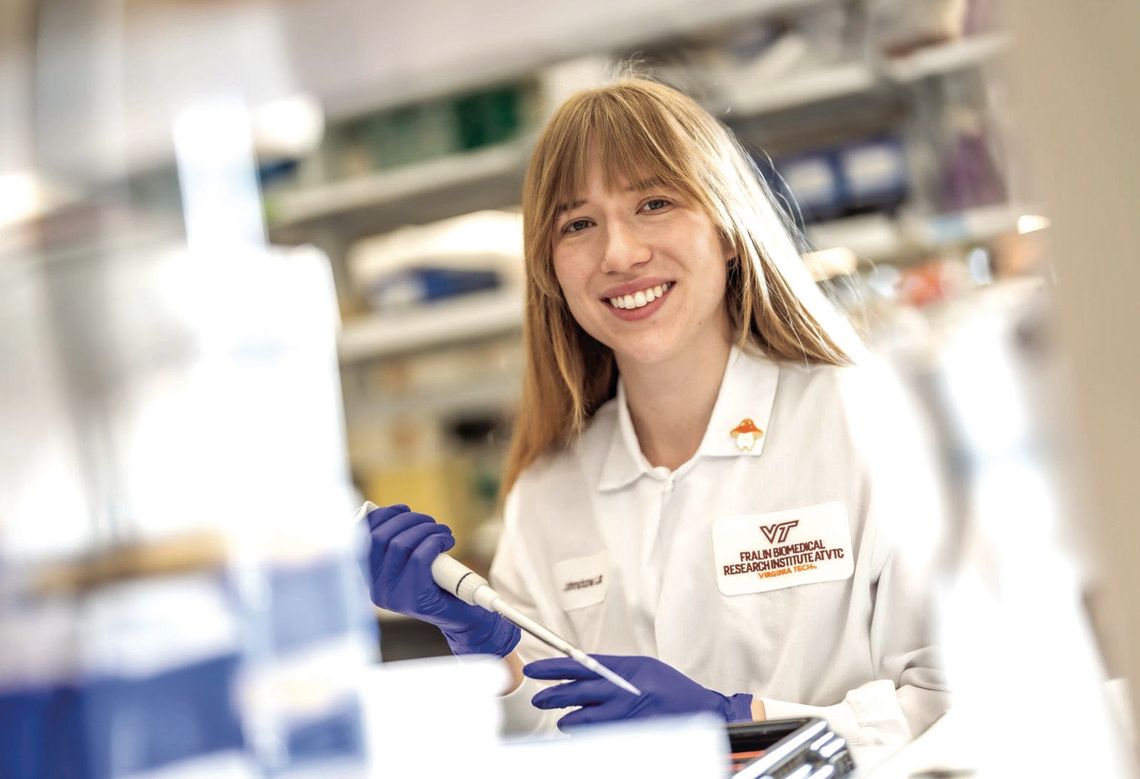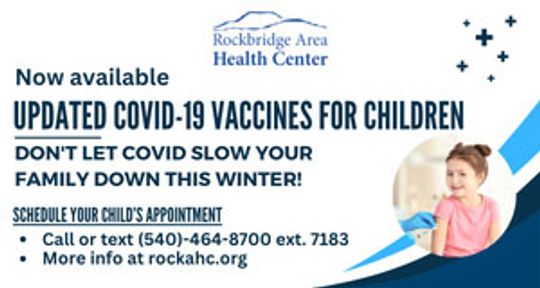Editor’s note: The following story was written by Matt Chittum for Virginia Tech and published on the school’s website. As you will see, it’s about Megan Sedovy, a 2016 graduate of Rockbridge County High School. Her father is Dr. John Sedovy, a local surgeon who has been with Bath Community Hospital since 2022. Her mother, Rhonda Sedovy, worked as a nurse until 2012, managing the Rockbridge Surgical Clinic at which her father worked at the time.
Megan received her undergraduate degree from Virginia Tech in 2020 and is now a doctoral candidate there.
Before she felt the allure of scientific discovery, Meghan Sedovy thought she’d be a doctor.
Her father is a surgeon, and her mother was a nurse. She spent hours hanging around the hospital, even observing surgeries back home in Rockbridge County, so she came by the desire to help and heal honestly.
But when she was an undergraduate at Virginia Tech, a different idea intruded. We need doctors, a professor said in a speech, but there’s also opportunity for powerful impact on human health further upstream, developing the drugs, methods, and technologies that doctors use in the clinic.
Now a doctoral candidate in Virginia Tech’s Translational Biology, Medicine, and Health Graduate Program, Sedovy is moving fast along that very path.
She was recently awarded a three-year, $101,000 Ruth L. Kirschstein Predoctoral Individual National Research Service Award from the National Institutes of Health (NIH) to explore wound healing in arteries after heart surgery. Her research is based on a discovery she made in the Johnstone Lab at Fralin Biomedical Research Institute at VTC – that arteries used in heart bypass surgeries are often stripped of a crucial layer of endothelial cells, without which a surgery’s chances of long-term success can be significantly impaired.
“I just want to make cellularlevel discoveries, to really understand what’s happening in disease and why it’s happening,” Sedovy said. She’s partly motivated by growing up in a rural setting. “Cardiovascular disease is the most deadly disease there is, but it does disproportionately affect rural communities. The desire to help my community is an inspiration for wanting to be able to correct these problems and keep people from dying from preventable diseases.”
Sedovy’s mentor, Scott Johnstone, believes she will make a difference.
“The success that she’s had is not accidental,” said Johnstone, assistant professor at the Fralin Biomedical Research Institute and Virginia Tech’s Department of Biological Sciences. “Meghan came to the lab with very clear goal in mind, to do translational research. She is the example of what you want for a graduate student. She works hard. She takes initiative. She cooperates well with others, she trains people. She’s got a great attitude and she’s got a clear vision for what she wants.”
Sedovy was previously awarded an American Heart Association predoctoral fellowship, but relinquished it in order to be able to accept the NIH grant, which is based on her discovery of the absence of endothelial cells in the blood vessel samples.
Johnstone’s lab studies blood vessels, how they are put together, and what happens to them in health and disease.
As part of that, the lab obtains sections of blood vessels left over after heart bypass surgeries at Carilion Clinic’s Roanoke Memorial Hospital. Sedovy drives to the hospital, waits outside the operating room, and collects the vessels herself.
The lab’s research had focused on smooth muscle cells in the arteries – which make up artery walls and give them shape and structure as well as regulate the flow of blood and pressure in the vessels through dynamic changes in their tone. But vessels also contain endothelial cells – a one-cell thick layer that lines the vessel interior and prevents leakage.
When Sedovy went to see what that layer of cells looked like in the hospital samples, she found it was missing, apparently destroyed in the process of removing and storing the vessels from patients’ legs for use in the heart. The researchers went back to the hospital for samples that were preserved immediately after surgery and found the endothelial layer was still badly damaged.
With that cell layer gone, the transplanted vessel could produce clots as it tries to heal, which could stop blood flow to the heart with sometimes fatal results.
With the NIH grant, Sedovy is studying how to promote healing in these cases. Her research focuses on a protein called Connexin 43, which is more abundant in smaller arteries that have been injured. Sedovy and Johnstone believe the protein facilitates healing. Sedovy’s research aims to learn how with plans to use that information to create a new therapy to aid heart surgery patients.
Sedovy’s long-term goal includes creating start-up companies to deliver such innovations to doctors and patients, and she believes she’s in the right place to get started.
Along with her research, Sedovy has completed the Fralin Health Sciences and Technology Commercialization Fellowship Program, which trains budding scientists in the methods and language of commercialization of discoveries including pitching their ideas to potential investors.
She’s grateful for the support of Johnstone, who works closely with her both in the lab and on presentations and proposals as well as the Fralin Biomedical Research Institute and the Translational Biology, Medicine, and Health Graduate Program.
“They’ve created this environment that lets you go out and try things, to try to be exceptional and they’re there to support you,” she said. “They really give off this impression that your success is their success.”
MEGAN SEDOVY, a doctoral candidate in Virginia Tech’s Translational Biology, Medicine, and Health Graduate Program, was recently awarded a three-year, $101,000 Ruth L. Kirschstein Predoctoral Individual National Research Service Award from the National Institutes of Health to explore wound healing in arteries after heart surgery. (photo by Clayton Metz for Virginia Tech)
.jpg)


